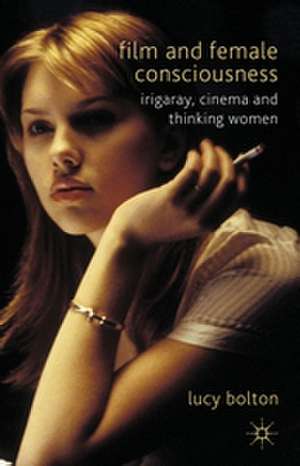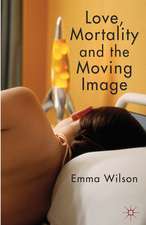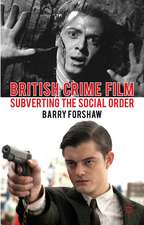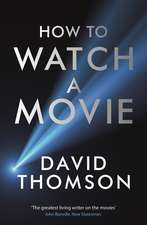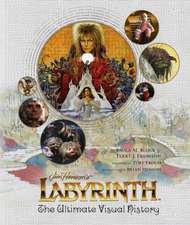Film and Female Consciousness: Irigaray, Cinema and Thinking Women
Autor L. Boltonen Limba Engleză Hardback – 28 iul 2011
Bolton's approach demonstrates how the encounter between the philosophy of Luce Irigaray and cinema can yield a fuller understanding of the fundamental relationship between film and philosophy. Furthermore, the book explores the implications of this approach for filmmakers and spectators, and suggests Irigarayan models of authorship and spectatorship that reinvigorate the notion of women's cinema.
| Toate formatele și edițiile | Preț | Express |
|---|---|---|
| Paperback (1) | 415.95 lei 6-8 săpt. | |
| Palgrave Macmillan UK – 28 iul 2011 | 415.95 lei 6-8 săpt. | |
| Hardback (1) | 393.52 lei 6-8 săpt. | |
| Palgrave Macmillan UK – 28 iul 2011 | 393.52 lei 6-8 săpt. |
Preț: 393.52 lei
Nou
Puncte Express: 590
Preț estimativ în valută:
75.32€ • 81.85$ • 63.31£
75.32€ • 81.85$ • 63.31£
Carte tipărită la comandă
Livrare economică 22 aprilie-06 mai
Preluare comenzi: 021 569.72.76
Specificații
ISBN-13: 9780230275690
ISBN-10: 0230275699
Pagini: 248
Ilustrații: X, 233 p.
Dimensiuni: 152 x 229 x 23 mm
Greutate: 0.54 kg
Ediția:2011
Editura: Palgrave Macmillan UK
Colecția Palgrave Macmillan
Locul publicării:London, United Kingdom
ISBN-10: 0230275699
Pagini: 248
Ilustrații: X, 233 p.
Dimensiuni: 152 x 229 x 23 mm
Greutate: 0.54 kg
Ediția:2011
Editura: Palgrave Macmillan UK
Colecția Palgrave Macmillan
Locul publicării:London, United Kingdom
Cuprins
Acknowledgements
Abbreviations
Introduction
'Frozen in Showcases': Feminist Film Theory and the Abstraction of Woman
The Camera as an Irigarayan Speculum
In the Cut: Self-Endangerment or Subjective Strength?
Lost in Translation: The Potential of Becoming
Morvern Callar: In a Sensory Wonderland
Architects of Beauty and the Crypts of Our Bodies: Implications for Filmmaking and Spectatorship
Concluding Remarks: The Object is Speaking
Bibliography
Filmography
Discography
Notes
Index
Abbreviations
Introduction
'Frozen in Showcases': Feminist Film Theory and the Abstraction of Woman
The Camera as an Irigarayan Speculum
In the Cut: Self-Endangerment or Subjective Strength?
Lost in Translation: The Potential of Becoming
Morvern Callar: In a Sensory Wonderland
Architects of Beauty and the Crypts of Our Bodies: Implications for Filmmaking and Spectatorship
Concluding Remarks: The Object is Speaking
Bibliography
Filmography
Discography
Notes
Index
Recenzii
'Film and Female Consciousness opens up enticing fresh horizons for the feminist and philosophical study of authorship and spectatorship in cinema.' - Annette Kuhn, Queen Mary, University of London, UK
'Entering into the seriously playful spirit of Luce Irigaray's work, Lucy Bolton shifts the signifier of the cinematic from womenslaughter to women's laughter. Putting the 'close' into close reading, Bolton attends to the haptic strategies by which Jane Campion, Sofia Coppola and Lynne Ramsay intimate their female protagonists' Irigarayan becoming. Gestural, chromatic, musical, and tactile communion are echoed in Bolton's lucid readings, which will inspire future filmmakers, as well as film theorists, of all genders to enter, like Frannie, Charlotte and Morvern, a hopeful, feminist future.' - Sophie Mayer, author, The Cinema of Sally Potter
Film and Female Consciousness is a fresh and engaging approach to what is often considered a well-trodden and even passé subject in film studies. Bolton's book suggests a potential methodology for the future of feminist film criticism in a way that opens up new directions in a discipline that had contented itself with circuitous discussions surrounding the dearth of interesting and new representations of female subjectivity, identity and interiority in mainstream female characters. - Alexia Bowler, Feminist & Women's Studies
'Entering into the seriously playful spirit of Luce Irigaray's work, Lucy Bolton shifts the signifier of the cinematic from womenslaughter to women's laughter. Putting the 'close' into close reading, Bolton attends to the haptic strategies by which Jane Campion, Sofia Coppola and Lynne Ramsay intimate their female protagonists' Irigarayan becoming. Gestural, chromatic, musical, and tactile communion are echoed in Bolton's lucid readings, which will inspire future filmmakers, as well as film theorists, of all genders to enter, like Frannie, Charlotte and Morvern, a hopeful, feminist future.' - Sophie Mayer, author, The Cinema of Sally Potter
Film and Female Consciousness is a fresh and engaging approach to what is often considered a well-trodden and even passé subject in film studies. Bolton's book suggests a potential methodology for the future of feminist film criticism in a way that opens up new directions in a discipline that had contented itself with circuitous discussions surrounding the dearth of interesting and new representations of female subjectivity, identity and interiority in mainstream female characters. - Alexia Bowler, Feminist & Women's Studies
Notă biografică
Lucy Bolton is Lecturer in Film Studies at Queen Mary University of London, UK. She is the author of numerous articles and book chapters on film philosophy and film stardom, and the co-editor (with Christina Siggers Manson) of Italy on Screen: National Identity and Italian Imaginary (2010).
Textul de pe ultima copertă
Film and Female Consciousness analyses three contemporary films that offer complex and original representations of women's thoughtfulness and individuality: In the Cut (2003), Lost in Translation (2003) and Morvern Callar (2002). Lucy Bolton compares these recent works with well-known and influential films that offer more familiar treatments of female subjectivity: Klute (1971), The Seven Year Itch (1955) and Marnie (1964). Considering each of the older, celebrated films alongside the recent, unconventional works illustrates how contemporary filmmaking techniques and critical practices can work together to create provocative depictions of on-screen female consciousness.
Bolton's approach demonstrates how the encounter between the philosophy of Luce Irigaray and cinema can yield a fuller understanding of the fundamental relationship between film and philosophy. Furthermore, the book explores the implications of this approach for filmmakers and spectators, and suggests Irigarayan models of authorship and spectatorship that reinvigorate the notion of women's cinema.
Bolton's approach demonstrates how the encounter between the philosophy of Luce Irigaray and cinema can yield a fuller understanding of the fundamental relationship between film and philosophy. Furthermore, the book explores the implications of this approach for filmmakers and spectators, and suggests Irigarayan models of authorship and spectatorship that reinvigorate the notion of women's cinema.
Caracteristici
Demonstrates the importance of Luce Irigaray's writings for understanding the cinematic representation of female interiority and consciousness. Structured around analysis of three carefully matched pairs of films Contributes to the growing body of work on Film and Philosophy, which is a growing area attracting a lot of academic interest. Analysis of modern, respected and well known films as well as popular classics – broad appeal to film scholars and more general readers. Focus on female directors – topical because of growing interest in women filmmakers (such as Kathryn Bigelow, Andrea Arnold).
